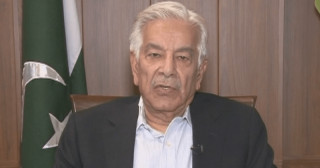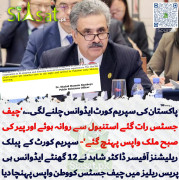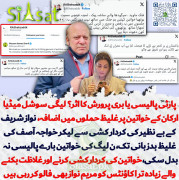jigrot
Minister (2k+ posts)
In the contemporary global environment, blaming Pakistan for terrorist incidents without proper investigation has become an unfortunate and dangerous trend. Recent incidents, particularly involving tensions in South Asia, show how premature accusations against Pakistan are often used to create a narrative that portrays it as a state sponsor of terrorism. This pattern not only undermines regional peace but blatantly disregards fundamental principles of international law, due process, and diplomacy. Such actions — including threats of war, cancellation of treaties, and coercive diplomacy — are incompatible with the norms and legal standards set by the international community.
Presumption of Innocence and the Right to Due Process
Under international law, every state has the right to the presumption of innocence until proven guilty, just as individuals do. The United Nations Charter, a foundational document of international relations, emphasizes in Article 2(4) the prohibition on the threat or use of force against the territorial integrity or political independence of any state. When countries accuse Pakistan of terrorist activities without conducting thorough, neutral investigations, they violate not only the spirit of international cooperation but also the principle of sovereign equality enshrined in Article 2(1) of the UN Charter.
Additionally, international human rights frameworks, including the Universal Declaration of Human Rights (UDHR, Article 11), uphold the right to be presumed innocent until proven guilty in a court of law. When states bypass proper procedures and issue threats against Pakistan, they effectively apply a "guilty until proven innocent" standard at the international level, which is fundamentally unjust and dangerous.
The Role of Neutral Investigations
International norms require that any allegations, especially those related to terrorism, be subjected to impartial, evidence-based investigations. Instruments such as the International Convention for the Suppression of Terrorist Bombings (1997) and United Nations Security Council Resolution 1373 (2001) stress the importance of investigating terrorist acts and bringing perpetrators to justice through cooperation, evidence-sharing, and due judicial process — not through unilateral accusations or media trials.
In several recent incidents, including in 2024 and 2025, certain countries have accused Pakistan of involvement in attacks without presenting verifiable evidence. Instead of allowing independent international bodies or joint investigations to examine the facts, these countries have immediately resorted to diplomatic isolation tactics, threats of military action, and the suspension of bilateral agreements. Such conduct undermines not only Pakistan’s rights but also the credibility of the global fight against terrorism, which should be based on fact, law, and fairness, not political expediency.
Threats of War and Cancellation of Treaties: A Violation of International Obligations
Threatening war or canceling established treaties without lawful cause is another grave violation of international law. The Vienna Convention on the Law of Treaties (1969) provides a clear legal framework for how treaties may be modified or terminated. Article 60 of the Convention permits termination or suspension of a treaty only in response to a "material breach" — and even then, only after following proper legal procedures, including notifications and negotiations. Unilateral and retaliatory cancellations, without proof of breach established by a competent authority, are unlawful.
Similarly, the UN Charter permits the use of force only in cases of self-defense against an armed attack (Article 51) or with Security Council authorization. Mere allegations — especially without investigation — do not meet the threshold required to justify military action under international law. Threats to wage war on Pakistan, based solely on political accusations rather than confirmed evidence, represent a direct violation of the prohibition against the use of force.
Weaponizing the Terrorist Narrative
Perhaps most concerning is the way some states use terrorism allegations to craft a political narrative aimed at demonizing Pakistan globally. This deliberate framing ignores Pakistan’s own sacrifices in the war against terrorism — sacrifices acknowledged by international actors, including the United States and the United Nations. Pakistan has lost tens of thousands of civilians and military personnel in its internal fight against extremism and has consistently participated in international counterterrorism efforts.
Turning terrorism into a political weapon not only undermines genuine global counterterrorism cooperation but also erodes trust among nations. It promotes polarization and increases the risk of unnecessary conflicts, rather than fostering the collective, rule-of-law-based approach that is needed to tackle global security threats.
Conclusion
In sum, blaming Pakistan for terrorist attacks without investigation, threatening war, and canceling treaties without legal justification, are clear violations of international law and diplomatic norms. Such actions ignore the basic principles of due process, sovereignty, and peaceful dispute resolution enshrined in the UN Charter, the Vienna Convention on the Law of Treaties, and customary international law. International relations must be governed by evidence, dialogue, and respect for legal frameworks — not by political narratives or hasty accusations. To ensure lasting peace and genuine security, all states must commit to impartial investigations, lawful conduct, and respect for the rights of all nations, including Pakistan.
It is important to recognize that attempting to spend money to buy influence through traitors or pressurizing Pakistan to act according to foreign interests is neither a wise nor sustainable approach. True and lasting change within Pakistan must come from the will of the Pakistani people themselves. When the people of Pakistan place pressure on their own institutions, meaningful and organic change can occur. Furthermore, it is well understood that Pakistan faces significant strategic limitations. Therefore, pushing Pakistan into a corner, where it is left with no acceptable options, is a reckless and dangerous strategy. No one should underestimate the risks involved in forcing a proud nation into desperate choices — choices that could have catastrophic consequences not just for the region, but for the entire world. Responsible diplomacy, dialogue, and respect for sovereignty must prevail over coercive tactics.
Presumption of Innocence and the Right to Due Process
Under international law, every state has the right to the presumption of innocence until proven guilty, just as individuals do. The United Nations Charter, a foundational document of international relations, emphasizes in Article 2(4) the prohibition on the threat or use of force against the territorial integrity or political independence of any state. When countries accuse Pakistan of terrorist activities without conducting thorough, neutral investigations, they violate not only the spirit of international cooperation but also the principle of sovereign equality enshrined in Article 2(1) of the UN Charter.
Additionally, international human rights frameworks, including the Universal Declaration of Human Rights (UDHR, Article 11), uphold the right to be presumed innocent until proven guilty in a court of law. When states bypass proper procedures and issue threats against Pakistan, they effectively apply a "guilty until proven innocent" standard at the international level, which is fundamentally unjust and dangerous.
The Role of Neutral Investigations
International norms require that any allegations, especially those related to terrorism, be subjected to impartial, evidence-based investigations. Instruments such as the International Convention for the Suppression of Terrorist Bombings (1997) and United Nations Security Council Resolution 1373 (2001) stress the importance of investigating terrorist acts and bringing perpetrators to justice through cooperation, evidence-sharing, and due judicial process — not through unilateral accusations or media trials.
In several recent incidents, including in 2024 and 2025, certain countries have accused Pakistan of involvement in attacks without presenting verifiable evidence. Instead of allowing independent international bodies or joint investigations to examine the facts, these countries have immediately resorted to diplomatic isolation tactics, threats of military action, and the suspension of bilateral agreements. Such conduct undermines not only Pakistan’s rights but also the credibility of the global fight against terrorism, which should be based on fact, law, and fairness, not political expediency.
Threats of War and Cancellation of Treaties: A Violation of International Obligations
Threatening war or canceling established treaties without lawful cause is another grave violation of international law. The Vienna Convention on the Law of Treaties (1969) provides a clear legal framework for how treaties may be modified or terminated. Article 60 of the Convention permits termination or suspension of a treaty only in response to a "material breach" — and even then, only after following proper legal procedures, including notifications and negotiations. Unilateral and retaliatory cancellations, without proof of breach established by a competent authority, are unlawful.
Similarly, the UN Charter permits the use of force only in cases of self-defense against an armed attack (Article 51) or with Security Council authorization. Mere allegations — especially without investigation — do not meet the threshold required to justify military action under international law. Threats to wage war on Pakistan, based solely on political accusations rather than confirmed evidence, represent a direct violation of the prohibition against the use of force.
Weaponizing the Terrorist Narrative
Perhaps most concerning is the way some states use terrorism allegations to craft a political narrative aimed at demonizing Pakistan globally. This deliberate framing ignores Pakistan’s own sacrifices in the war against terrorism — sacrifices acknowledged by international actors, including the United States and the United Nations. Pakistan has lost tens of thousands of civilians and military personnel in its internal fight against extremism and has consistently participated in international counterterrorism efforts.
Turning terrorism into a political weapon not only undermines genuine global counterterrorism cooperation but also erodes trust among nations. It promotes polarization and increases the risk of unnecessary conflicts, rather than fostering the collective, rule-of-law-based approach that is needed to tackle global security threats.
Conclusion
In sum, blaming Pakistan for terrorist attacks without investigation, threatening war, and canceling treaties without legal justification, are clear violations of international law and diplomatic norms. Such actions ignore the basic principles of due process, sovereignty, and peaceful dispute resolution enshrined in the UN Charter, the Vienna Convention on the Law of Treaties, and customary international law. International relations must be governed by evidence, dialogue, and respect for legal frameworks — not by political narratives or hasty accusations. To ensure lasting peace and genuine security, all states must commit to impartial investigations, lawful conduct, and respect for the rights of all nations, including Pakistan.
It is important to recognize that attempting to spend money to buy influence through traitors or pressurizing Pakistan to act according to foreign interests is neither a wise nor sustainable approach. True and lasting change within Pakistan must come from the will of the Pakistani people themselves. When the people of Pakistan place pressure on their own institutions, meaningful and organic change can occur. Furthermore, it is well understood that Pakistan faces significant strategic limitations. Therefore, pushing Pakistan into a corner, where it is left with no acceptable options, is a reckless and dangerous strategy. No one should underestimate the risks involved in forcing a proud nation into desperate choices — choices that could have catastrophic consequences not just for the region, but for the entire world. Responsible diplomacy, dialogue, and respect for sovereignty must prevail over coercive tactics.





































